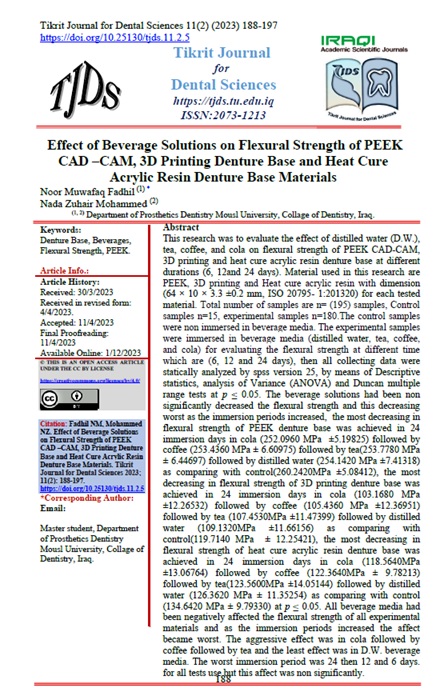Effect of Beverage Solutions on Flexural Strength of PEEK CAD –CAM, 3D Printing Denture Base and Heat Cure Acrylic Resin Denture Base Materials
Noor Muwafaq Fadhil
Department of Prosthetics Dentistry Mousl University, Collage of Dentistry, Iraq
Nada Zuhair Mohammed
Department of Prosthetics Dentistry Mousl University, Collage of Dentistry, Iraq.
DOI: https://doi.org/10.25130/tjds.11.2.5
Keywords: Denture Base, Beverages, Flexural Strength, PEEK
Abstract
This research was to evaluate the effect of distilled water (D.W.), tea, coffee, and cola on flexural strength of PEEK CAD-CAM, 3D printing and heat cure acrylic resin denture base at different durations (6, 12and 24 days). Material used in this research are PEEK, 3D printing and Heat cure acrylic resin with dimension (64 × 10 × 3.3 ±0.2 mm, ISO 20795- 1:201320) for each tested material. Total number of samples are n= (195) samples, Control samples n=15, experimental samples n=180.The control samples were non immersed in beverage media. The experimental samples were immersed in beverage media (distilled water, tea, coffee, and cola) for evaluating the flexural strength at different time which are (6, 12 and 24 days), then all collecting data were statically analyzed by spss version 25, by means of Descriptive statistics, analysis of Variance (ANOVA) and Duncan multiple range tests at p ≤ 0.05. The beverage solutions had been non significantly decreased the flexural strength and this decreasing worst as the immer sion periods increased, the most decreasing in flexural strength o f PEEK denture base was achieved in 24 immersion days in cola (252.0960 MPa ±5.19825) followed by coffee (253.4360 MPa ± 6.60975) followed by tea(253.7780 MPa ± 6.44697) followed by distilled water (254.1420 MPa ±7.41318) as comparing with control(260.2420MPa ±5.08412), the most decreasing in flexur al strength of 3D printing denture base was achieved in 24 immersion days in cola (103.1680 MPa ±12.26532) followed by coffee (105.4360 MPa ±12.36951) followed by tea (10 7.4530MPa ±11.47399) followed by distilled water (109.1320 MPa ±11.66156) as comparing with control(119.7140 MPa ± 12.25421), the most decreasing in flexural strength of heat cure acrylic resin denture base was achieved in 24 immersion days in cola (118.5640MPa ±13.06764) follow ed by coffee (122.3640MPa ± 9.78213) followed by tea( 123.5600MPa ±14.05144) followed by distilled water (126.3620 MPa ± 11.35254) as comparing with control (134.6420 MPa ± 9.79330) at p ≤ 0.05. All beverage media had been negatively aff ected the flexural strength of all experimental materials and as t he immersion periods increased the affect became worst. The aggressive effect was in cola followed by coffee followed by tea and the least effect was in D.W. beverage media. The worst immersion period was 24 then 12 and 6 days. for all tests use but this affect was non significantly.




